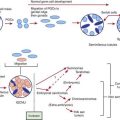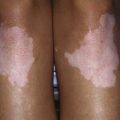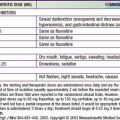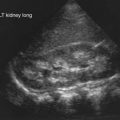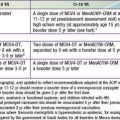Chapter 549 Gynecologic Care for Girls with Special Needs
Abuse
The risk for sexual abuse in teens with disabilities is difficult to estimate. Studies show that teens with physical disabilities are just as sexually active as their nondisabled counterparts but that more of their activity is nonvoluntary. Screening for abuse is mandatory. Abuse prevention education can include the No! Go! Tell! model. For teens with limited verbal capacity or developmental delay, abuse may be very hard to detect. The care provider needs to be vigilant in looking for signs on physical exam, such as unexplained bruises or scratches, or changes in behavior that may be indications of sexual abuse in those adolescents (Chapters 37.1 and 113).
Pelvic Examination
A pelvic exam is rarely indicated in teens who are not sexually active, unless they have vulvar issues such as discharge, irregular bleeding, suspicion for abuse, or foreign body and an external inspection can be performed. A speculum exam is not performed, and if the vagina or cervix needs to be visualized, an exam under anesthesia by a gynecologist should be considered. Testing for STIs can be accomplished by urine testing or vaginal swabs (Chapter 114).
Menstruation
Irregular menstruation is common in teenagers, especially the first 5 years after menarche, due to immaturity of the hypothalamic-pituitary-ovarian (HPO) axis and subsequent anovulation (Chapter 110). Several conditions in teens with disabilities are associated with an even higher risk of irregular cycles. Teens with Down syndrome have a higher incidence of thyroid disease. There is a higher incidence of reproductive issues, including PCOS in teens with epilepsy and on certain antiepileptic drugs (AEDs) (Chapter 546). Antipsychotic medication can cause hyperprolactinemia, which can affect menstruation.
Contraception (Chapter 111)
Estrogen-Containing Methods
Progesterone-Only Methods
American College of Obstetricians and Gynecologists. ACOG committee opinion no.415: depot medroxyprogesterone acetate and bone effects. Obstet Gynecol. 2008;112:727-730.
Bonny A, Ziegler J, Harvey R, et al. Weight gain in obese and nonobese adolescent girls initiating depot medroxyprogesterone, oral contraceptive pills, or no hormonal contraceptive method. Arch Pediatr Adolesc Med. 2006;160:40-45.
Cheng MM, Udry JR. Sexual behaviors of physically disabled adolescents in the United States. J Adoles Health. 2002;31:48-58.
Eastgate G. Sexual health for people with intellectual disability. Salud Publica Mex. 2008;50(Suppl 2):s255-s259.
Edelman AB, Koontz SL, Nichols MD, et al. Continuous oral contraceptives: are bleeding patterns dependent on the hormones given? Obstet Gynecol. 2006;107:657-665.
Gold MA, Johnson LM. Intrauterine devices and adolescents. Curr Opin Obstet Gynecol. 2008;20:464-469.
Gray SH, Emans SJ. Abnormal vaginal bleeding in adolescents. Pediatr Rev. 2007;28:175-182.
Lin K, Barnhart K. The clinical rationale for menses-free contraception. J Women’s Health. 2007;16:1171-1180.
O’Brien MD, Guillebaud J. Contraception for women with epilepsy. Epilepsia. 2006;47:1419-1422.
O’Connell K, Burkman RT. The transdermal contraceptive patch: an updated review of the literature. Clin Obstet Gynecol. 2007;50:918-926.
Quint EH. Menstrual issues in adolescents with physical and developmental disabilities. Ann NY Acad Sci. 2008;1135:230-236.
Rohleder P, Swartz L. Providing sex education to persons with learning disabilities in the era of HIV/AIDS: tensions between discourses of human rights and restriction. J Health Psychol. 2009;14:601-610.
Savelli SL, Kerlin BA, Springer MA, et al. Recommendations for screening for thrombophilic tendencies in teenage females prior to contraceptive initiation. J Ped Adolesc Gynecol. 2006;19:313-316.
Schwier KM, Hingsvurger D. Sexuality: your sons and daughters with intellectual disabilities. Baltimore: Paul H. Brookes; 2000.
Sulak PJ, Smith V, Coffee A, et al. Frequency and management of breakthrough bleeding with continuous use of the transvaginal contraceptive ring: a randomized controlled trial. Obstet Gynecol. 2008;112:563-571.

